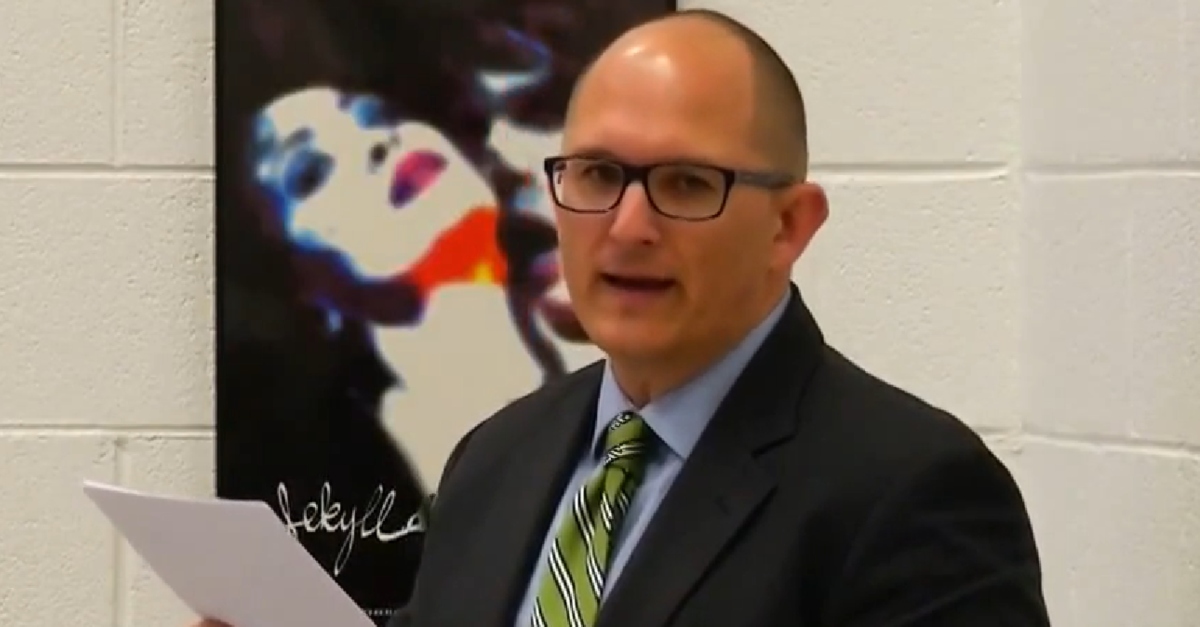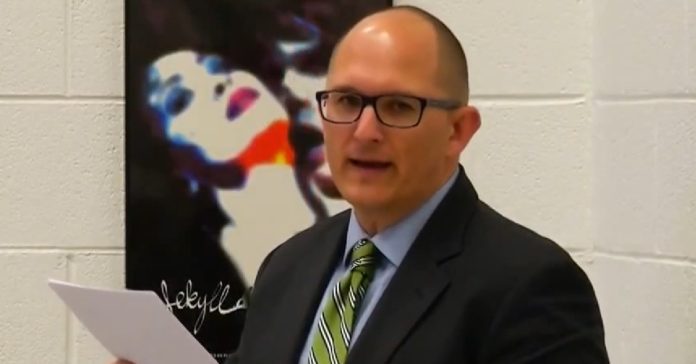
Peter Vlaming in 2018. (Screenshot: WRIC)
The Virginia Supreme Court on Thursday reinstated the lawsuit that a French teacher filed against the school board that fired him for refusing to use a transgender boy’s pronouns.
Peter Vlaming, who taught French at West Point High School for six years, repeatedly receiving “positive evaluations.” That changed in the 2017-2018 school year, however, when a student, identified in the lawsuit as John Doe, “intended to transition to a male identity.”
Although Vlaming agreed to refer to the student by their new, traditionally masculine name, the teacher balked at using male pronouns.
The issue to came to a head on Oct. 31, 2018, according to The Richmond Times-Dispatch. The student was reportedly using a virtual reality headset when Vlaming, a teacher at West Point High School, told the other kids to keep “her” from crashing into a wall. The teacher was also accused of simply avoiding pronouns for the teenager at all, causing the student to feel singled out.
“For Vlaming, this request asked him to violate his conscience,” the high court’s ruling summarized. “He holds religious and philosophical convictions [that] … ‘sex is fixed in each person, and that it cannot be changed, regardless of our feelings or desires.””
The teacher alleged that “he cannot in good conscience ‘use pronouns that express an objectively untrue ideological message,’” according to the ruling. His “conscience and religious practice” prohibited him “from intentionally lying, and he sincerely believes that referring to a female as a male by using an objectively male pronoun is telling a lie.”
After he was fired, he sued the school board under Virginia’s law establishing the right to religious expression. The Circuit Court of King William County dismissed, finding that even assuming all the allegations in his complaint were true, Vlaming’s claim was not supported by that law.
The Virginia Supreme Court disagreed.
The judges found that the “essential character” of free expression jurisprudence “seeks to protect diversity of thought, diversity of speech, diversity of religion, and diversity of opinions.”
“[N]o government committed to these principles can lawfully coerce its citizens into pledging verbal allegiance to ideological views that violate their sincerely held religious beliefs,” the decision also said. The judges found that the lower court “erred dismissing this claim on demurrer on the ground that Vlaming’s factual allegations, even if assumed to be true, were insufficient as a matter of law to state a free-exercise claim” under Virginia law.
In its ruling, the Virginia high court said that hurt feelings is sometimes the cost of free speech.
“When religious liberty merges with free-speech protections, as it does in this case, mere ‘objectionable’ and ‘hurtful’ religious speech or, as in this case, nonspeech, is not enough to meet this standard,” the opinion said.
Justice Thomas Peter Mann, who concurred in part and dissented in part, said he agreed with the majority opinion that the circuit court made a mistake and that Vlaming’s lawsuit was “legally viable.” Nonetheless, he said the majority mishandled their analysis of the plaintiff’s claims.
“Regarding Vlaming’s free-exercise claim, the majority establishes a sweeping super scrutiny standard with the potential to shield any person’s objection to practically any policy or law by claiming a religious justification for their failure to follow either,” he wrote (citations omitted). “Justice Antonin Scalia, writing on behalf of the Supreme Court of the United States, warned that interpreting a free exercise clause so broadly would permit an individual ‘to become a law unto himself.’ Under the majority’s analytical framework, all laws and regulations must yield to an individual’s invocation of religious freedom unless doing so results in ‘overt acts against peace and good order.’ I disagree.”
“I am being punished for what I haven’t said,” Vlaming said at the time, according to the Times-Dispatch. He said he agreed to use the student’s new name, but he attempted to avoid using pronouns for the teen at all. He said it was against his Christian beliefs to refer to the transgender boy as male.
Have a tip we should know? [email protected]

